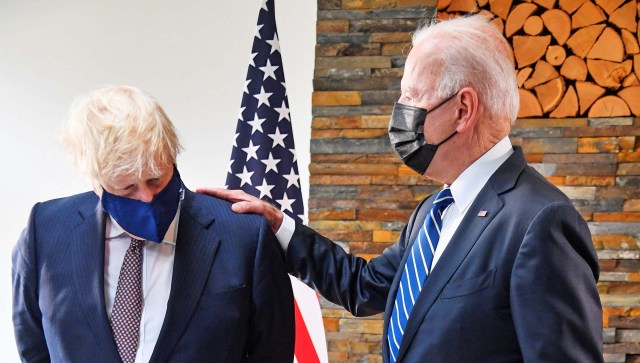Biden has made quite the entrance (Photo by Toby Melville – WPA Pool/Getty Images)

Despite all the predictable grandstanding, despite yet another meaningless promise to create a better world, this year’s G7 summit could, for once, be consequential. And that’s all thanks to Joe Biden.
As soon as the President touched down at RAF Mildenhall in Suffolk this week, he made it clear he was a man reborn. He was, he told US service personnel serving at the airbase, going to meet Vladimir Putin once the G7 wrapped up and “let him know what I want him to know”. Cue a great roar of approval from the servicemen stood behind him, and an even greater roar of approval from the US media.
Of course, if President Biden’s predecessor was still in office and had said something similar, he would no doubt have been accused of being “bellicose”; his words would be heralded up as proof that he lacked diplomatic skills and was at serious risk of starting World War III. But different presidency, different rules.
Perhaps it is unsurprising that President Biden should wish to be seen to be standing up against Vladimir Putin. After all, the Russian leader is an easy target for Western leaders hoping to display some clout.
The same cannot be said for Biden’s host country, which makes the US President’s recent broadside against Britain all the more perplexing. In the lead-up to today’s summit, Anglo-American relations were subjected to two contradictory developments. On the one hand, Biden and Boris Johnson met yesterday to sign a new Atlantic Charter, modelled on the historic statement agreed by Franklin D. Roosevelt and Winston Churchill in 1941. The contents of the Charter are typically vague, though the intent behind it is obvious: it is an attempt to breathe new life into the much-vaunted (by the British at least) “Special Relationship”.
For Biden, the agreement also slots in nicely with his oft-repeated claim that “America is back” — as though it somehow disappeared from the world stage in the four years before he became President. Initiatives like this go some way to making it look like America is becoming a grown-up player again, deftly rebuilding important alliances that were allegedly damaged during the Trump era.
That may also explain the Biden administration’s second, more uncharacteristic incursion into British politics: the decision of the White House to instruct Yael Lempert — its most senior diplomat in the UK — to accuse Boris Johnson of imperilling the Irish peace process over Brexit.
It was, as Keir Starmer predictably acknowledged, an “unprecedented” outburst. But it also reflected an interestingly non-pragmatic side to the Biden administration; a side that is deeply ideological and seems willing to risk a diplomatic fallout in order to satisfy internal pressures within his party. For the warning, remarkable as it was, forms part of an ongoing and very curious set of misunderstandings which have taken hold at the very top of the Democratic Party.
Speaker Nancy Pelosi is just one of a number of senior figures who in recent years has claimed that Britain’s decision to leave the EU risks upsetting the Good Friday Agreement. Only last September, she castigated Dominic Raab on the matter, warning: “If the UK violates its international agreements and Brexit undermines the Good Friday accord, there will be absolutely no chance of a UK-US free trade agreement passing the Congress.”
This view seems to get some of its impetus from the connection — in the minds of many US Democrats, at least — between the Brexit vote and the election of Donald Trump. But there is another reason why this strange ideological strand exists within the Democratic Party: the prevalence of a dogmatically pro-Irish reunification agenda.
For much of this century, administrations on both sides have tended to downplay this aspect of American politics — not least because in the wake of 9/11, George W Bush took a suitably strong line against the IRA and its political allies. But now, thanks to the misguided belief that Brexit could imperil the Good Friday Agreement, this ugly element of Democrat politics has returned.
This became clear almost exactly a year ago, when Chuck Schumer — the current Senate Majority leader — agreed to speak at an online conference organised by Sinn Fein; among the other speakers was Gerry Adams. In his remarks, Schumer boasted that while “the road to Irish unity” is “now more within reach today than at any time”. He then went on to say: “I wish you the best in your critical efforts to build support for a truly united Ireland.”
Put to one side the fact that Schumer gave his approval to a political party that approves of terrorism. The fact that a senior American politician would publicly say that to anyone is, in itself, extraordinary; it’s like the Leader of the House of Commons wishing success to anyone in Texas who wants to break away from the United States.
It seems, then, that Yael Lempert and Joe Biden are in good company. But while it is one thing for a US President to be bellicose with Vladimir Putin, it is quite another to do the same with a close ally who is acting on a decision ordered in a democratic referendum.
So for once, I suspect this year’s G7 summit won’t be remembered as yet another pointless gathering, garlanded with the usual soundbites about the rule of law and the importance of democracy. For while Joe Biden’s administration makes one set of noises about the promises of Anglo-American cooperation, its behaviour in the past week has revealed the opposite: that it views British democracy as a threat to its own ideological agenda.










Join the discussion
Join like minded readers that support our journalism by becoming a paid subscriber
To join the discussion in the comments, become a paid subscriber.
Join like minded readers that support our journalism, read unlimited articles and enjoy other subscriber-only benefits.
Subscribe